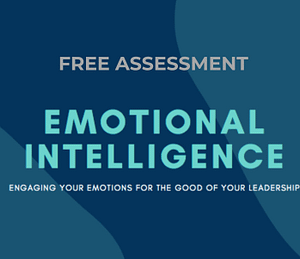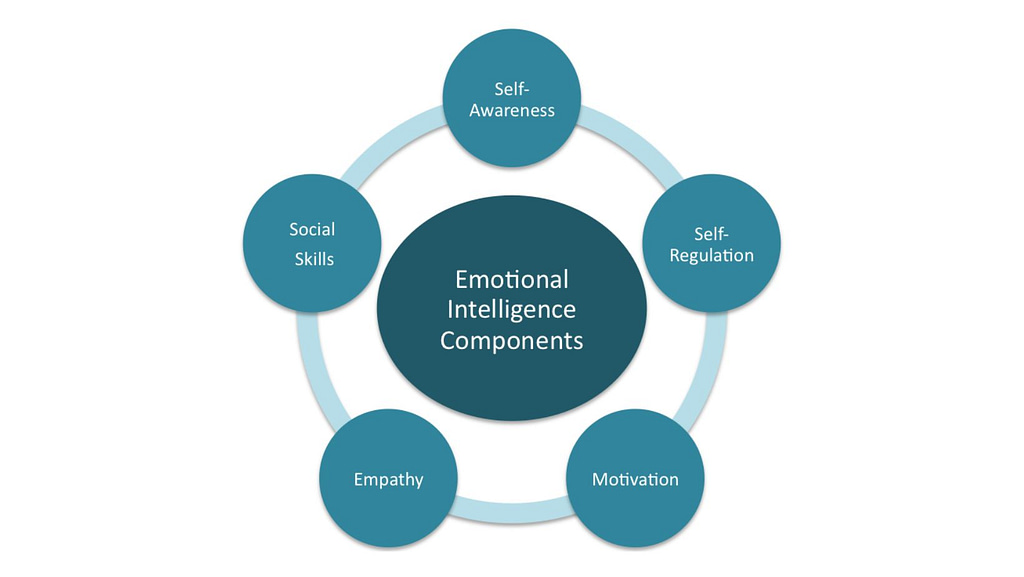In recent years emotional intelligence has become a must-have skill for getting a job and obtaining career success.
EI is an essential skill to succeed in any profession and for any managerial or leadership position.
Even if you are aspiring to get promoted to a managers or a leaders post or have become a new manager for the first time or joined a new place , honing your emotional intelligence skill is very critical for managing people and inspiring them.
Research by EQ provider Talent smart shows that EQ is the strongest predictor of performance.
In a survey conducted by career builder, 71 % of employers said they look for hiring employees with higher EQ compared to IQ.
The importance of emotions cannot be denied.
In recent years workplaces are recognizing the importance of emotions because emotions have a direct impact on your performance and it also affects the workplace environment because people work together in a team.

The following Facts have been found regarding emotional intelligence :
-
Happiness leads to more productivity
-
People with higher emotional intelligence remain calm under pressure
-
Happy employees are more motivated and perform better.
-
Calm leaders and managers can take better decisions.
-
They are more empathetic towards co-workers
-
They can solve workplace problems and minimize stress quickly by resolving conflicts.
-
They are quickly adaptable to change.
-
They are highly resilient.
-
They have a positive attitude and a positive attitude contributes to healthy working environments and more cohesiveness in a team.
-
Happy employees are better engaged and can be retained for longer.
-
People with higher Emotional Intelligence have more advantages in the workforce than those with lower emotional intelligence.
By now the importance of emotional intelligence as a must-have skill in the workplace is clear to you.
Daniel Goleman laid out five major components which are critical for emotional intelligence.
In order to develop or improve your emotional intelligence, it’s important to understand what each domain entails and how each of them are interconnected.
The purpose of this post is to help you become aware of the 5 domains of Emotional intelligence and the interconnection between each, so that you can work on each of them and develop them for more success in your career.
Let us explore the 5 Domains of emotional intelligence .
5 DOMAINS OF DANIEL GOLEMAN’S EMOTIONAL INTELLIGENCE FRAMEWORK
1. SELF AWARENESS
In research by Tasha Eurich, an Organisational Psychologist, it was found that 95 % of people think they are self-aware, but only 10 to 15 % are truly self-aware.
A lack of self-awareness can pose problems to other employees in the organization.
Self-awareness is the heart of everything.
Self-awareness is the ability to recognize your strengths and weaknesses, your feelings, and how you react to people and situations, and also understand how your emotions and actions can affect your performance as well as others around you.
Highly self-aware people can use this self-knowledge and manage themselves more effectively in any situation.
Here are some traits of people who have a higher self-awareness:
-
They are more authentic.
-
They have an understanding of their motivation, values, and goals and how it affects their thoughts and behavior.
-
They have a better understanding of their behavior and how they are perceived by others in the organization.
-
They can understand and label their emotions, eg stress, low inspiration, disappointment, or frustration, and take appropriate action to address them.
-
They are highly capable of inspiring others. They know that to bring out the best in others, they must bring out the best in themselves.
-
They can set better boundaries.
-
They are effective communicators and are able to interact with others more positively.
-
They increase their team’s motivation by engaging them, supporting and appreciating them, and doubling their chances of success.
People who are more self-aware focus more on self-reflection, and self-improvement.
They keep evaluating their performance from time to time and upgrade themselves to match others in the organizations -eg their boss, their colleagues, and direct reports.
On the other hand, people who are less aware lower their team’s motivation and success by half and increase stress in the organization.
Take the Free Assessment to know Your Level Of Awareness Here.
2. SELF MANAGEMENT
Higher self-awareness helps in better self-management.
Self-management is the ability to take charge of your life and make appropriate decisions for your well-being.
Leaders and Managers who can manage themselves better exhibit the following traits :
-
They take responsibility for their life.
-
They are proactive.
-
They are more purposeful, set meaningful goals, take action to achieve them, and evaluate their progress and results.
-
They are flexible and adaptable. They can adjust their plans as and when needed to reach their goals.
-
They are more self-regulated. They can regulate and manage their emotions in stressful and adverse situations. Instead of reacting they wait for the right time to express their emotions.
-
They are more thoughtful and clear-headed.
-
They are more resilient and maintain a positive outlook despite setbacks. Instead of sinking they learn from their mistakes and take corrective action by doing things differently.
Contrary to this, leaders and managers who have poor self-management skills are highly reactive and have a tough time keeping their impulses in control.
They frequently experience negative emotions like anger, stress, and anxiety which affect those around them negatively.
Lack of self-management and self-regulation affects their mental, and physical well-being.
Self-awareness is the first step to higher emotional intelligence. Without it, self-management is not possible.
3. SELF MOTIVATION
The inner fire or inspiration motivates us to fulfill our needs and goals.
Motivation means putting yourself into motion or taking action.
There are two types of motivation -internal and external motivation.
People who are intrinsically motivated are more connected to their inner desires, values, needs, and goals.
This keeps them pushing forward, despite adversities, setbacks, and failures.
On the other hand, people who are extrinsically motivated chase external things like money, fame, success, perks, or rewards.
When these things are absent, their performance also plummets in proportion to these external factors.
Therefore self-motivated employees are highly successful and are an asset to the organization.
People who are self-motivated are :
-
Constantly progressing despite failures, adversities, and setbacks by improving themselves. They constantly improve their knowledge, skills, and performance.
-
They are highly resilient and optimistic. They are more daring to take risks.
-
They are great problem solvers.
-
They are happier and enjoy life even in challenging times, which is why they experience overall success in all areas of their life.
People who are not self-motivated or who are motivated by external factors like fat paychecks, perks, success, and fame are more negative when these external factors change. They are low-risk takers.
They behave inappropriately by becoming anxious or stressed in adverse situations. This directly influences their performance.
They are less resilient.
Instead of taking ownership of mistakes and learning from them, they shift the blame to others. This lowers the team’s morale and performance.
4. SOCIAL AWARENESS
Social awareness is the ability to take the perspective of and empathize with others, including those from diverse backgrounds and cultures.
Empathy is very essential for higher social awareness.
DDI, a Global leadership development firm rates empathy as the number one leadership skill.
In their study, they found that leaders who master empathy performed more than 40 percent higher in coaching, engaging others, and decision-making.
In a separate study by researchers from The Centre For Creative Leadership, it was found that bosses viewed managers who were more empathetic toward their direct reports as better performers.
Managers and Leaders who are highly empathetic are :
-
Because of their empathetic and compassionate nature, they go out of their way to support and help others. They can build long-lasting relationships based on respect and trust. These valuable qualities help them collaborate well with colleagues in the organization.
-
They can see things from others’ perspectives. This makes them respond more thoughtfully and communicate effectively with others.
-
Able to create a happy culture at work, because they notice, understand, and respond well to the emotional needs of people who work with them.
-
They can manage diversity well and are successful in leveraging the unique perspectives and strengths of each member of the team.
-
They can better support their team, all while improving their performance as well.
-
They can recognize the dynamics in play in the organization and can maintain good harmony in the team.
-
They are good problem solvers because they are open-minded and welcome and appreciate different viewpoints from others. This helps them come up with innovative solutions to problems.
-
Because they can anticipate others’ needs and reactions well, they can negotiate better with internal and external stakeholders and customers.
-
They understand social and ethical norms for behavior and recognize family, school, and community resources and supports. This makes them more able to comprehend and appropriately react to both broad problems of society and interpersonal struggles.
5. SOCIAL SKILLS
Social skills are vital for Emotional intelligence because they help cultivate good relationships.
Cultivating and Managing relationships is all about interpersonal skills like building rapport, genuine trust and trusting others, and earning respect from colleagues.
People with a good relationship management abilities can:
-
People who have good social skills have genuine affection and respect for others and interact well with everyone. They care for others and are kind and compassionate toward them.
-
Inspire, guide, and develop a successful team of high performers.
-
They can influence, coach, and mentor team members more effectively.
-
They are great at resolving conflicts and solving issues that crop up. In a research, it was found out that unresolved conflicts resulted in a wastage of eight hours of company time in gossip time, and draining the morale of staff.
-
Can build and maintain positive relationships with team members, clients, stakeholders, customers, and other outside people who support the company. This helps the business of the organization in many ways by increasing sales, customer loyalty and retention, and high customer satisfaction and staff retention.
CONLCUSION
As I mentioned in the beginning of the post , how important emotional intelligence skill is in the workplace and the 5 domains of emotional intelligence as described by Daniel Goleman, I am sure you now agree on how important a skill it is for success in career and profession.
Mastering your emotional intelligence can make a drastic difference in your life and career and to those around you .
And the best way to go about it is to begin with self awareness and then move to the next domain in the sequence they are written in the post .
Now over to you , which domain do you think you need most help with ?
Get the Free EI Assessment to know and work on improving your EQ Below:

No Fields Found.
Please share your thoughts below .
Babita Sharma
Leadership Coach







